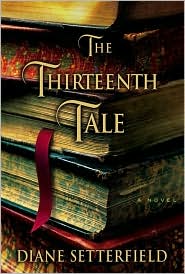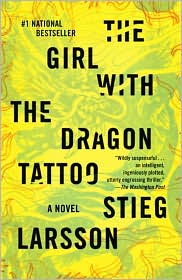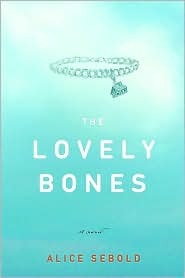If you view one of these movies without having read the book by the same title, there is little room for disappointment. For example, my gleeful enjoyment of the first Twilight movie (which I saw in the theatre for free) inspired me to finally read the series. Also, I've never cracked a Harry Potter book, and thus harbor no disenchantment with the filmmaker's choices. But when you have read the book upon which a movie is based, and especially if you loved said book, it is common to feel, as the credits roll, some combination of dissatisfaction, aggravation, and grief at the disturbance to the movie your imagination alone created while reading.
How often, then, do you finish a book and think it would work better as a movie? I would say it is a rare notion in the afterglow of a fine story. The last book I finished left me feeling this way, however, and as I wondered if that was a strange estimation, two other books came to mind that had given me a similar impression. So either I just like movies better than books, or perhaps the sentiment isn't so strange after all.
There are a few reasons that I think The Thirteenth Tale by Diane Setterfield would work better as a movie. First of all, for all the author's adjective-laden paragraphs describing her settings, I still had a hard time envisioning the scenes and spatial relations as the characters interacted. Sometimes that isn't a big deal, but this story was somewhat dependent on each character's point of view within the setting. And I do think that the images and tone Ms. Setterfield worked so laboriously to describe could be captured instantaneously with the camera. Also, flashback narratives tend to annoy me because there is no way a person could remember all that quoted dialogue to flesh out the story. But I believe those flashback scenes could be handled very effectively with creative cinematography, and then when the twist all comes to light at the end, a series of clips of the same scenes from a different perspective would make the emergence of understanding so satisfying. As it is written, I really had to search back for how the revelation of truth could have possibly worked in the story. It would take a second read to identify with any certainty where I believe there may be holes in the possibility, beyond my general disbelief that (spoiler alert, highlight to read) half-sisters could look enough alike to be mistaken for the same person. Maybe a movie could make some sense of that.
There was SOOOOO much hype about this book, and if you've read it, then you might be wondering why I would possibly want to see some of the grotesque imagery it contains portrayed on film. I realize that this title has already been released in theatres, and I have not decided whether or not I will watch it. But bear with me while I explain why I prefer the idea of Girl with the Dragon Tattoo by Stieg Larsson as a movie. My overall impression of this novel is that all of the action was condensed into the third quarter. Sometimes it takes a chapter or two to get into a story, but I was nearly halfway through this book before I began to feel engaged. And the denouement also fell flat after the exciting climax was wrapped up with nearly 100 pages yet to go. So much boring political background and family tree illuminating could be handled far more efficiently on film, and the ending could be condensed, leaving the satisfying thrill nearer the actual end of the story. Plus, I wouldn't have to stumble over pronunciation of a litany of Swedish names with all their excessive consonants.
I picked up this hardback at a garage sale last summer because the jacket description sounded so intriguing (excerpt): The story of Susie Salmon, who is adjusting to her new home in heaven, a place that is not at all what she expected, even as she is watching life on earth continue without her. There is a great deal I expected from such a unique concept that unfortunately I didn't get from The Lovely Bones by Alice Sebold. It's been over a year since I read it, but I do clearly remember having the distinct thought that this book would have made a better movie. And at the time I had no idea that one was about to be released! It hasn't been on my mind until musing about this post in recent days, so I moved it near the top of my Netflix queue so I can finally see whether or not I am right. While I don't relish viewing the events which lead to the vile end of Susie Salmon's life on earth, I hope they will be handled with taste enough to capture the wretched tragedy without being vulgar. Because the book was really a character drama, delving into the fundamental changes in people after losing a daughter, sister, friend (and also those who are not changed by it), I hope to experience in the movie a more seamless flow of the story as a whole. I'll let you know how it goes.
If you have read any of these books and/or seen their Hollywood adaptations, please share your thoughts! Feel free to disagree...



3 comments:
I had that feeling about "The Devil Wears Prada." It was a horrible excuse for literature, but I remember thinking "this would be a decent chick-flick, better than the book at least." I didn't bother to finish the book. :P
I think Fight Club made a better movie than book, because visually it is so interesting to have two different people playing a single character. it was such a shocking twist in the movie but felt a little melodramatic in the book.
Read Lovely Bones and have seen the movie. I thought some of the scenes in the movie badly punctured the storyline and ruined it. I'm interested to hear what you think.
I read The Thirteenth Tale. I thought it was nothing special but it never occurred to me that it would be great as a movie. I think you're right.
Dragon Tattoo horrified the bloody heck out of me so I stopped reading it and thus have no opinion except that if there is a movie, I will stay far away from it.
Lovely Bones - I've seen the movie, not read the book. I thought the heaven scenes in the movie were weird. Not in a good way, either. So that left the murder mystery which was fine, if disturbing.
Post a Comment